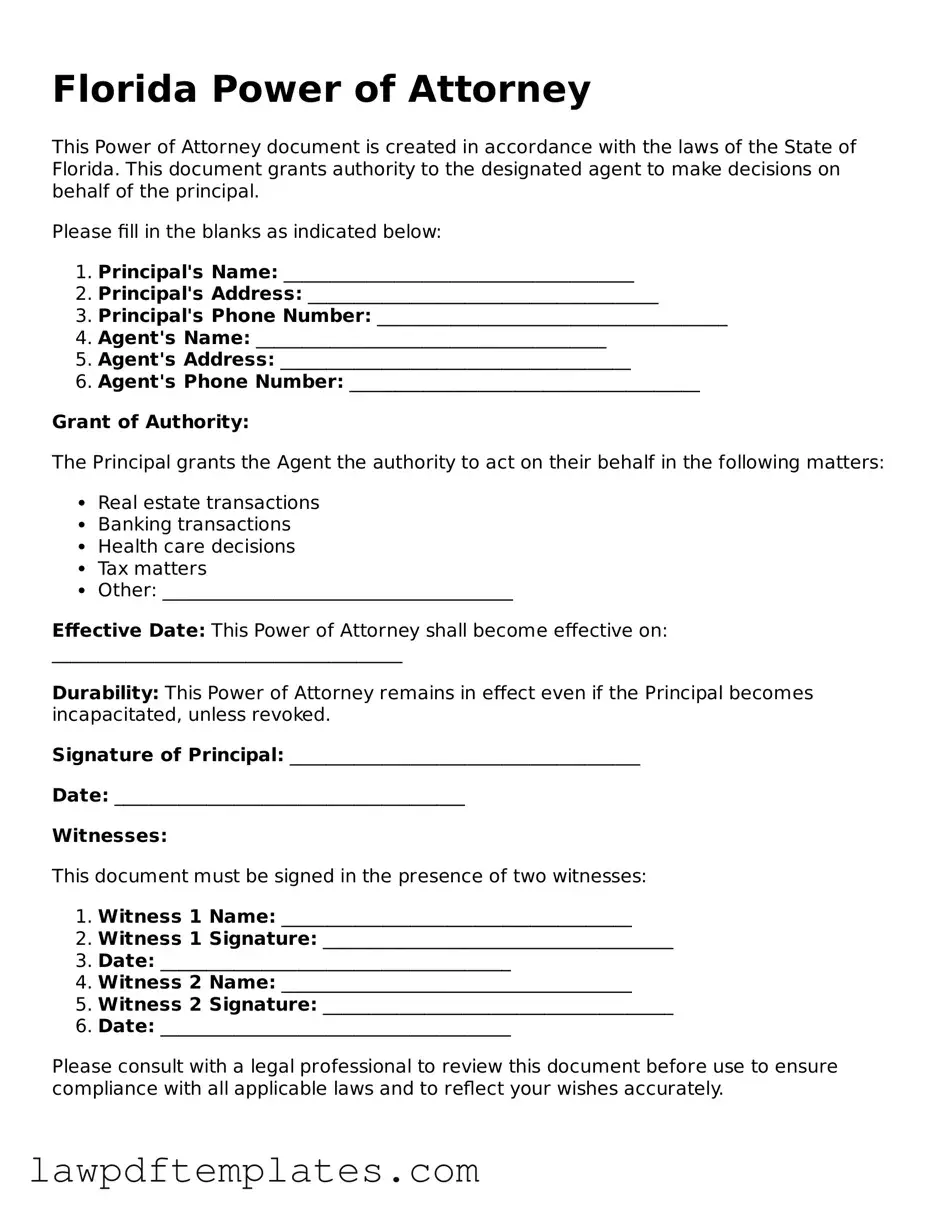Free Power of Attorney Template for the State of Florida
Form Breakdown
| Fact Name | Description |
|---|---|
| Definition | A Florida Power of Attorney form allows an individual to designate another person to act on their behalf in legal and financial matters. |
| Governing Law | The Florida Power of Attorney is governed by Florida Statutes, Chapter 709. |
| Types | There are several types of Power of Attorney forms, including durable, springing, and limited powers of attorney. |
| Durable Power | A durable Power of Attorney remains effective even if the principal becomes incapacitated. |
| Springing Power | A springing Power of Attorney becomes effective only upon the occurrence of a specified event, such as the principal's incapacity. |
| Revocation | The principal can revoke the Power of Attorney at any time, as long as they are competent to do so. |
| Notarization | In Florida, the Power of Attorney must be signed in the presence of a notary public to be legally valid. |
| Agent's Authority | The agent's authority can be broad or limited, depending on the specific powers granted in the document. |
Sample - Florida Power of Attorney Form
Florida Power of Attorney
This Power of Attorney document is created in accordance with the laws of the State of Florida. This document grants authority to the designated agent to make decisions on behalf of the principal.
Please fill in the blanks as indicated below:
- Principal's Name: ______________________________________
- Principal's Address: ______________________________________
- Principal's Phone Number: ______________________________________
- Agent's Name: ______________________________________
- Agent's Address: ______________________________________
- Agent's Phone Number: ______________________________________
Grant of Authority:
The Principal grants the Agent the authority to act on their behalf in the following matters:
- Real estate transactions
- Banking transactions
- Health care decisions
- Tax matters
- Other: ______________________________________
Effective Date: This Power of Attorney shall become effective on: ______________________________________
Durability: This Power of Attorney remains in effect even if the Principal becomes incapacitated, unless revoked.
Signature of Principal: ______________________________________
Date: ______________________________________
Witnesses:
This document must be signed in the presence of two witnesses:
- Witness 1 Name: ______________________________________
- Witness 1 Signature: ______________________________________
- Date: ______________________________________
- Witness 2 Name: ______________________________________
- Witness 2 Signature: ______________________________________
- Date: ______________________________________
Please consult with a legal professional to review this document before use to ensure compliance with all applicable laws and to reflect your wishes accurately.
Common mistakes
Filling out a Florida Power of Attorney form can seem straightforward, but there are common pitfalls that individuals often encounter. One significant mistake is failing to specify the powers granted. A general Power of Attorney gives broad authority, but if you want to limit that authority to specific actions, it’s essential to clearly outline those powers. Without this clarity, your agent may have more authority than you intended, which can lead to unintended consequences.
Another frequent error is neglecting to date the document properly. The date on your Power of Attorney is crucial because it indicates when the authority begins. If the form is not dated or dated incorrectly, it could create confusion about when the agent can start acting on your behalf. Always ensure the date is clearly marked to avoid any potential disputes.
People also often forget to sign the document in the presence of a notary public. In Florida, notarization is typically required for a Power of Attorney to be valid. Skipping this step can render the document ineffective, leaving your agent without the legal authority to act on your behalf. It’s a simple step, but one that is easily overlooked.
Additionally, failing to inform the appointed agent about their responsibilities is a common mistake. After designating someone as your agent, it’s vital to discuss the role with them. They should understand the powers you’re granting and be willing to accept the responsibility. Without this communication, your agent may be unprepared or unwilling to act when the time comes.
Lastly, many individuals forget to review and update their Power of Attorney as circumstances change. Life events such as marriage, divorce, or the death of a loved one can impact your choices. Regularly reviewing your document ensures it reflects your current wishes and circumstances. Neglecting this important step can lead to confusion or conflict in the future.
Discover More Power of Attorney Templates for Specific States
Power of Attorney in Ohio Requirements - Ensures that important decisions are made with your best interests in mind.
Power of Attorney Georgia - Using a Power of Attorney can help avoid the need for guardianship proceedings.
Filling out the necessary documentation is vital when transferring vehicle ownership, and a comprehensive resource is available to assist you in this process: the Motor Vehicle Bill of Sale form. This form not only facilitates the legal transfer but also safeguards the rights of both the seller and the buyer, making it an essential tool for any vehicle transaction in California.
How to Get a Power of Attorney in Arizona - Designate someone you trust to handle your legal paperwork and obligations using this form.
